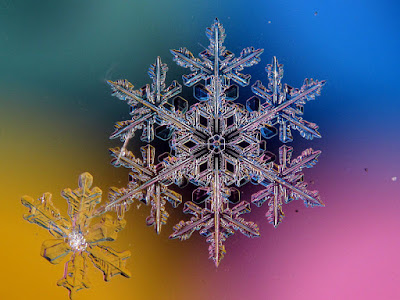This time of year, my mind drifts back to Pennsylvania
winters of my childhood, and the wonder of snow falling all around. Like an
angel’s kiss floating to my mittened palm, each snowflake would linger for a
moment before vanishing into thin air. Later I learned that each snowflake was
unique, symmetrical, like a six-pointed star, an ice crystal that could melt
into water or sublimate into vapor.
Before scientists invented magnifying lenses, the beautiful, delicate crystalline shape of the snowflake could be fully appreciated only by God Himself, which may be why He, in illustrating His great power, asked Job if he had ever entered into the treasures of the snow (Job 38:22).
Six, like the sides of the snowflake, is the number of man (Revelation 13:18), for God created man on the sixth day to be the crowning jewel of His creation, made in His image (Genesis 1:26-31). How amazing that Creator God has a distinct design for every snowflake, even though we don’t usually see it because the flakes clump together or dissolve before our eyes.
Small wonder, then, that the Creator Who devoted so much attention to the snowflake also created each of us to be unique. Each of us is special, not only physically based on our DNA structure (Psalm 139:14), but in terms of the soul that motivates us and the plan He has predestinated for each of His children since before the beginning of time (Romans 8:29-30; Ephesians 1:5,11).
Like the snowflake, our physical existence is all too short, like a warm breath that escapes our lips only to disappear into the frosty air (James 4:14). The snowflake may transform from a crystal to vapor, or it may compact with others into a glacier of tremendous power, sculpting the earth and depositing precious soil where it is needed. Or it may melt, becoming part of a mountain stream that nourishes the earth in early spring, not only with water, but with dissolved minerals.
Whether melted or evaporated, the snowflake enters the never-ending water cycle that hydrates the earth, a fact that was supernaturally recorded in the book of Job, by inspiration of the Holy Spirit, thousands of years before science had discovered it (Job 6:15-17; 24:19; 37:6,9-12; 15-22; 38:22-37). If we are born again (John 3:3-8) by trusting in the death, burial and resurrection of Jesus Christ (1 Corinthians 15:1-4), we may mingle together in rivers of His Living Water, bringing spiritual refreshment to all whose lives we touch (John 4:10-11; 7:37-38; Song of Solomon 4:15; Jeremiah 2:13; 17:13; Revelation 7:17).
Snow does not last long in the form it originally appears, and our time on earth is also limited (Job 14:1). Once the curse of sin entered the Garden of Eden through Adam and Eve’s disobedience (Genesis 3), death and dying entered too, so man could no longer live forever in his earthly body.
But the apostle Paul tells of the amazing transformation that occurs once our corrupt, mortal body enters the earth. Although it decays, like a snowflake melts or a seed appears to shrivel away, it awaits God’s awakening power. When Jesus Christ returns for His children, the bodies of those saints who have died will be resurrected into glorified, immortal bodies, never again to age; to feel pain, sickness or sorrow; to sin or to die (1 Corinthians 15:35-58).
And like the snowflake that vanishes or sublimates, God’s children who are still alive when Christ returns will disappear from the sight of those who are left behind, for we too will be changed into immortal bodies that are caught up into the air to meet with Jesus Christ and live forever with Him (1 Thessalonians 4:13-18).
When snow blankets the grime-covered, muddy streets, all appears new, fresh and pure, reminding me of the new beginnings God gives us every morning (Lamentations 3:22-23). Job speaks of cleansing his hands in snow water (Job 9:30). But true, complete cleansing comes only from the shed blood of Jesus, which has washed away our sins, turning them from scarlet to the pure white of driven snow (Psalm 51:7; Isaiah 1:18).
When we trust Him as Lord and Savior, He clothes us with the whitest robes of His righteousness (Job 29:14; Psalm 132:9; Isaiah 61:10) and remembers our sins no more (Psalm 103:12). One day we will see Him face to face (1 Corinthians 13:12) and perceive that His clothing and even His head and hair are white as snow (Daniel 7:9; Matthew 28:3; Mark 9:3; Revelation 1:14).
May those of us who are blessed to see snowflakes this winter take the time to reflect on their pristine beauty and to admire the handiwork of the Master Designer, with His infinite attention to every detail. May we thank Him for the cleansing power of His shed blood. May we remember that He created each of us uniquely beautiful, to fulfill the perfect plan He has for each of us until He raptures us to live forever with Him!
© 2016 Laurie Collett
















